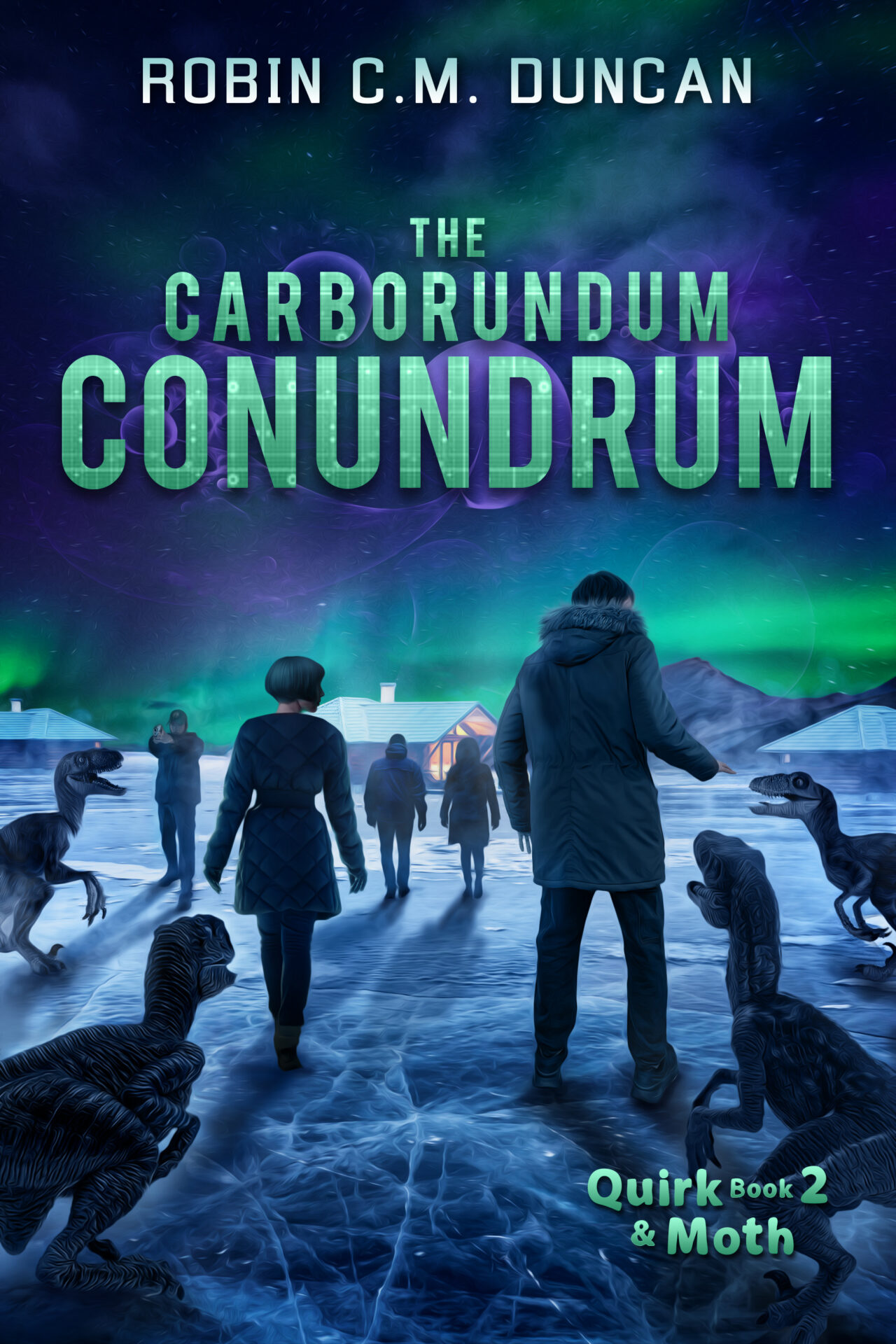
Robin C.M. Duncan is joining us today to talk about his novel, The Carborundum Conundrum. Here’s the publisher’s description:
Quirk and Moth have avoided killing each other long enough to solve another case. They decide on a local job next, and take up the search for a missing scientist. How could Quirk know this new mystery put them on a headlong collision course with his troubled past, a plethora of personal issues, and a hoard of genetic hybrid creatures with an appetite for anything that moves?
When their client dies in mysterious circumstances, law enforcement pursues the dysfunctional duo all the way to a research lab in frozen Yellowknife. Can Quirk and Moth find the scientist before they are banged up for murder, or has she already been eaten? Is it coincidence Quirk’s father-in-law bought the company? Can they expose the shadow from Quirk’s past and clear their names?
Quirk and Moth need time, but it’s fast running out, and the bodies are piling up. Find out what happens in The Carborundum Conundrum!
What’s Robin’s favorite bit?

Robin C.M. Duncan
I have been very fortunate in my writing career. When I think of that phrase, I can’t help but recall the quote popularised by golfer Gary Player: “The harder I practice, the luckier I get.” I’d hate to think that sounds glib, but it captures the essence of what I want to discuss here; how lucky I feel to have achieved the success I have, and how that luck came not just from my own endeavours (or all the support from my wife!), but also the commitment and generosity of the writing community. That is my favourite bit of every project, not just my new book itself, but what it represents.
All writers know how hard it is to create even an objectively bad first draft—as most tend to be, and all writers know—after hundreds of hours of further work—there is no guarantee of success. That is why I equate success with progress, and my second novel, The Carborundum Conundrum, represents significant progress for me. But does luck come into that at all?
I began writing in my teens, but only for my own enjoyment, to test myself, and out of a love of language and storytelling. I wrote six novels in thirty years. Only over the last decade have I committed to writing for publication, a goal I reached in 2021 with two novellas in the successful Distant Gardens anthology (My Favorite Bit, 2021). That book will always be special to me; there is nothing like holding your first publication in your hand. But was I lucky?
My strategy when I committed to seeking publication was to do something different each year, to expand my experience. In Year 1, I joined a writing group, the excellent Reading Excuses, hosted on Brandon Sanderson’s fan site. That decision led directly to meeting a handful of steadfast friends, to my first publication, and to me discovering one day that I had a publisher.
There was a degree of luck involved in that first deliberate step, but I prefer to think of it as good judgement. I was reading Wheel of Time, which led to Brandon Sanderson, who led to Writing Excuses, which led to the 17th Shard, and thence to RE. That discovery resulted in me critiquing hundreds of submissions over the years, and receiving many hours of critique in return. That’s where I met my friend and now publisher William C. Tracy, creator of Space Wizard Science Fantasy. A great deal of hard work from me and the RE community went into those first two novellas: they absolutely were my favourite thing in the world at that time. One novella featured Quirk and Moth.
By 2021, I had written two Quirk and Moth novels. A Writing Excuses prompt (s10e5) led to the creation of those characters. Luck again, right? For the dysfunctional duo might never have existed had I not been moved by that week’s prompt to describe a dead drop from three POVs. But it wasn’t luck. Back then I responded to every writing prompt, spent hours generating ideas, scenes, characters and dialogue, every week for the first twelve seasons before I became more selective. Not luck then, hard work; and not just by me, but by the group of authors who shared their expertise, and inspired my response.
Conventions, however, are the ultimate expression of my favourite bit of the writing process, that unparalleled sense of community. (I reject the aphorism that writing is a solitary profession.) I discovered cons late in my transition to serious writer by attending ‘the big show’; Worldcon in Dublin, 2019. Luck played no part in this step of my development; I discovered the overwhelmingly positive and motivational sense of community immediately on walking through Dublin Convention Centre’s doors, and even before that on social media.
Without recounting the amazing, eye-opening, and inspiring experiences I enjoyed at Worldcon, since then I have attended Fantasycon, Bristolcon, Bearsden Writing Festival, Satellite (Glasgow—twice), and Edinburgh’s fabulous Cymera Festival. The encouragement of the genre community—and I have to laud the Glasgow SF Writers’ Circle particularly in this—has led to so many opportunities for me. Yes, to share my writing and get it out there, but more importantly to participate in the community, to give back time, effort and motivation to other writers who perhaps have not yet been as ‘lucky’ as me.
I was always shy. I never talked about my writing when I started at the age of 14, nor later among family, colleagues and friends who I did not think would understand. It took years for me to develop the confidence to connect with other writers. But when you do that, if you are willing to seek new challenges, to make your own luck, that is when things happen.
I continue to look for opportunities to participate. In 2019, I joined the British Fantasy Society (BFS), and now review books and slush read for them. In 2021, I joined the British Science Fiction Association (BSFA), and now write articles for Focus Magazine. At BFS Fantasycon I moderated a panel. I began volunteering with Glasgow 2024 Worldcon. Now I take vendor tables, I perform readings—sometimes by invitation (I refer you again to the community’s generosity).
In 2022, my first novel was published. Also, I became Deputy Area Head Glasgow 2024 Presents, interviewing authors, preparing online panels, publishing author readings. I continue to try each year to do something new, and to contribute to the community that has brought me this far. No luck, just hard work and the generosity of others.
Because the thing you have to discover for yourself is that the genre community is full of people who aim to lift everyone up. That was my favourite bit of Distant Gardens, my favourite bit of my first novel, The Mandroid Murders, and is my favourite bit of this, The Carborundum Conundrum. Sure, we’re not all going to be Brandon Sanderson or Adrian Tchaikovsky, but if you participate in the community, put your shoulder to the wheel, and give to others, opportunities will come to you. Whether or not you call it luck is up to you.
LINKS:
The Carborundum Conundrum book link
BIO:
Robin was born and lives in Glasgow. He has written for decades, but seriously only for the last ten years. His debut novel The Mandroid Murders was published in 2022. He has stories in SWSF’s Distant Gardens, Farther Reefs and Juno anthologies. He reviews and slush reads for the British Fantasy Society, writes articles for the British Science Fiction Association, volunteers with Glasgow 2024 Worldcon, and belongs to the Glasgow Science Fiction Writers’ Circle, and the Reading Excuses critique group.The Carborundum Conundrum (Quirk & Moth, Book 2) is due for publication on June 20th this year.
